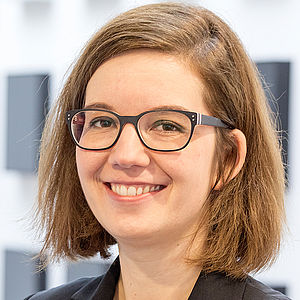Overview of Profiles
Professor Alsayed Algergawy
What is the value of scientific data that we have collected and how can we extract it?
What is the value of scientific data that we have collected and how can we extract it?
Professor Alsayed Algergawy has been the substitute for the Chair of Data and Knowledge Engineering at the University of Passau since April 2023. Before, he was the data manager of the collaborative research center (CRC) AquaDiva, where he is still responsible for the whole life cycle of the collected data. Besides, he is active in other projects focusing the management of scientific data collected from domains like biodiversity and agriculture. His research is focusing on integrating data provided from different sources making use of semantic web technologies and knowledge graphs.
Professor Tristan Barczak
How resilient are the state and administration in times of crisis?
How resilient are the state and administration in times of crisis?
Professor Tristan Barczak, LL.M., studied law at the University of Münster, earning his doctoral title (Dr. iur.) in 2011 at the Institute of Public Law and Politics located on the university's premises. After completing a master’s degree in medical and health law (LL.M.) and the mandatory practical clerkship at the Higher Regional Court of the Free and Hanseatic City of Hamburg, he was employed as a research assistant at the Federal Constitutional Court (BVerfG) from 2014 to 2017. Since 2020, he holds the Chair of Public Law, Security Law and Law of New Technologies at the University of Passau.
Professor Christoph Barmeyer
How can intercultural negotiation and development processes lead to cultural synergies?
How can intercultural negotiation and development processes lead to cultural synergies?
Professor Christoph Barmeyer has been holder of the Chair of Intercultural Communication at the University of Passau since 2008. The emphasis in his research is on management in cultural comparison, intercultural communication and the development of intercultural skills.
Professor Stefan Bauernschuster
How do political measures influence decisions made by individuals and families?
How do political measures influence decisions made by individuals and families?
Professor Stefan Bauernschuster has held the Chair of Public Economics of the University of Passau since 2013. Moreover, he is a research professor at the ifo Institute in Munich, CESifo Affiliate and a member of the Social Policy Committee of the German Economic Association. He is also one of the principal investigators of the DFG Research Training Group 2720.
Professor Michael Beurskens
How can global internet giants be regulated by the law?
How can global internet giants be regulated by the law?
Professor Michael Beurskens holds the Chair of Civil Law, German, European and International Business Law. He is interested in questions relating to the direct and indirect regulation of the digital economy, especially by way of antitrust law, and in questions regarding licence and liability law, for example in intellectual property law, in data protection law or in relation to non-compliant digital products and services.
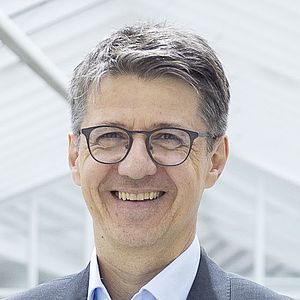
Professor Bernhard Bleyer
"How does a theological ethics arrive at scientific knowledge?“
"How does a theological ethics arrive at scientific knowledge?“
Professor Bernhard Bleyer has been with the Chair of Theological Ethics at the University of Passau since 2021. He heads the master's programme in Charity Studies and Values-Based Management as well as the Institute for Applied Ethics in Business and Education. After obtaining his doctorate in moral theology at the University of Regensburg in 2007 he went on to helm the Institute for Sustainability and Ethics at East Bavarian Technical University Amberg-Weiden. He then transferred to the Deggendorf Institute of Technology, joining the Professorship of Applied Ethics and Sustainable Development in Health Science. In 2019, he completed his habilitation at the Catholic Private University Linz.
Professor Suleika Bort
How can globally active organisations be designed and managed in a socially responsible and sustainable way?
How can globally active organisations be designed and managed in a socially responsible and sustainable way?
Professor Suleika Bort has been holder of the Chair of International Management and Social Entrepreneurship at the University of Passau since 2020. In addition, she is Chair of the Advisory Board of the Institute of Applied Ethics of the University of Passau and has been Vice Dean of the School of Business, Economics and Information Systems at the University of Passau since autumn 2023. Previously, Professor Bort was employed at the University of Mannheim, Chemnitz University of Technology, and the University of Sydney in Australia.
Professor Oliver Decker
What cultural patterns do people use online to present themselves?
What cultural patterns do people use online to present themselves?
Professor Hans-Georg Dederer
How does German, European and international law regulate new technologies?
How does German, European and international law regulate new technologies?
Professor Hans-Georg Dederer studied law at the University of Tübingen and at the University of Konstanz. He completed his doctorate, being conferred the title of Doctor iuris, at the University of Bonn in 1997. In 2003, he completed his habilitation at the same university. Professor Dederer has held the Chair of Constitutional and Administrative Law, Public International Law, European and International Economic Law at the University of Passau since 2009. Furthermore, he has been acting as a member of the Permanent Senate Commission on Genetic Research of the DFG since 2018 and serving as a member of the Standing Committee "Life Sciences" of the Leopoldina since 2023.
Professor Andreas Eberth
How can educational programs be devised in a forward-looking way in light of the challenges that come with Global Change?
How can educational programs be devised in a forward-looking way in light of the challenges that come with Global Change?
Professor Andreas Eberth has held the Professorship for Geography with a focus on Education for Sustainable Development at the University of Passau since March 2023. After working as a research assistant at the Institute of Science Education at Leibniz University Hannover, he served as Interim Professor of Geography Education at the Justus Liebig University in Giessen. In his capacity as chairperson of the Academic Association for Geography Education (HGD – Hochschulverband für Geographiedidaktik) he is committed to representing the interests of geography education across Germany.
Professor Robert Esser
What do human rights require of due process in criminal law, what are the limits of "effective" criminal prosecution?
What do human rights require of due process in criminal law, what are the limits of "effective" criminal prosecution?
Professor Robert Esser has held the Chair of German, European and International Criminal Law, Criminal Procedure Law and White-Collar Crime since 2007. He has been heading the Research Centre for Human Rights in Criminal Proceedings (HRCP) affiliated with the Chair since 2010. A particular focus of his work is basic research at universities and continuing judiciary and bar education on specific issues of human rights protection in international policy advice, specifically in Eastern and Southeastern Asia (China, Japan, Nepal, Taiwan, Vietnam).
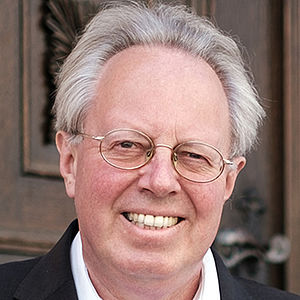
Professor Peter Fonk
What ethical principles do the managers of tomorrow need?
What ethical principles do the managers of tomorrow need?
Professor Peter Fonk has been holder of the Chair of Theological Ethics at the University of Passau since 1994/95. He is director of the masters study programme Science of Charity and Value-Oriented Management and of the Institute of Applied Ethics in Economy, Education and Training. The emphasis in his research is on Christian social ethics, economic and corporate ethics.
Professor Brigitte Forster-Heinlein
How can the essential information be filtered out of signals and images?
How can the essential information be filtered out of signals and images?
Professor Brigitte Forster-Heinlein has held the Professorship of Applied Mathematics at the University of Passau since April 2012. Previous positions include the Technical University of Munich, the École Polytechnique Fédérale de Lausanne and the HelmholtzZentrum Munich, where she led her Marie Curie Excellence Team. She is the founder and curator of the Passau Math Museum. The Stifterverband awarded her the Ars Legendi Faculty Prize for Mathematics in 2021. Her research focuses on harmonic analysis, approximation theory and complex analysis.
Professor Gordon Fraser
How can we find and prevent software errors?
How can we find and prevent software errors?
Professor Gordon Fraser has held the Chair of Software Engineering II at the University of Passau since 2017. After completing his doctorate at Graz University of Technology, he conducted research at Saarland University and the University of Sheffield. His research and teaching focusses on issues relating to software analysis, software development and the didactics of programming.
Professor Jin Gerlach
How are digital technologies changing humans and organisations?
How are digital technologies changing humans and organisations?
Professor Jin Gerlach holds the Chair of Internet and Telecommunications Business at the University of Passau. He earned his doctoral degree at the Technical University of Darmstadt.
Professor Stefan Glock
What are the asymptotic properties of very large discrete structures?
What are the asymptotic properties of very large discrete structures?
Professor Stefan Glock has been Assistant Professor of Discrete Mathematics at the University of Passau since September 2022. Prior to this, he spent three years researching at the Institute for Theoretical Studies at ETH Zurich after completing his doctorate at the University of Birmingham with the thesis 'Decompositions of graphs and hypergraphs'.
Professor Ulrich Gnewuch
How can we design AI-based information systems in a human-centered way?
How can we design AI-based information systems in a human-centered way?
Prof Dr Ulrich Gnewuch holds the Chair of Explainable AI-Based Business Information Systems at the University of Passau. His research at the intersection of information systems and human-computer interaction focuses on the design, use, and impact of artificial intelligence in business and society.
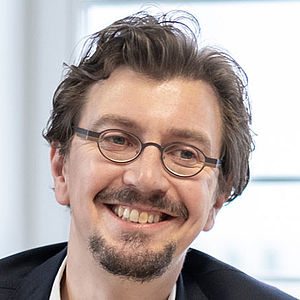
Professor Daniel Göler
Where is the European Union going?
Where is the European Union going?
Professor Daniel Göler holds the Jean Monnet Chair of European Politics at the University of Passau. His research focuses on all matters concerning European integration. Naturally, this involves academic networking across the globe. At the same time, the chair makes European political topics accessible to the general public by organising events and publishing the Jean Monnet Papers.
Professor Marc Goerigk
How can the best possible decisions be calculated using data-driven algorithms?
How can the best possible decisions be calculated using data-driven algorithms?
Professor Marc Goerigk has held the Chair of Business Decisions and Data Science at the University of Passau since 2023. Prior to that, he researched and taught at the Technical University of Kaiserslautern, Lancaster University Management School and the University of Siegen. His research focuses on how to derive the greatest possible benefit from available data in decision-making. In 2024, WirtschaftsWoche magazine named him the business studies professor under 40 with the strongest research record.
Professor Michael Granitzer
How can contexts of meaning be identified in a deluge of digital media?
How can contexts of meaning be identified in a deluge of digital media?
Professor Michael Granitzer holds the Chair of Data Science. His research focuses on the use of machine-based learning methods and intelligent human-machine interfaces.
Professor Michael Grimm
What are the measures that enable developing countries to participate in global market processes?
What are the measures that enable developing countries to participate in global market processes?
Professor Michael Grimm has held the Chair of Development Economics of the University of Passau since 2012. He is the Director of the Passau International Centre for Advanced Interdisciplinary Studies (PICAIS) and one of the Principal Investigators of the DFG Research Training Group 2720 "Digital Platform Ecosystems (DPE)". Prior to this, he held the posts of Professor of Applied Development Economics at Erasmus University Rotterdam, Visiting Professor at Paris School of Economics and Advisor for the World Bank in Washington, D.C. (United States).
Professor Christian Hammer
How to identify security gaps using information flow control?
How to identify security gaps using information flow control?
Professor Christian Hammer holds the Chair of Software Engineering I. Language-based software security is one of his main research interests. His particular focus is on the security of mobile and web applications, Internet-of-Things devices and concurrent systems. After earning his doctorate at the Karlsruhe Institute of Technology (KIT), he did research at IBM Research and Purdue University. He then went on to become a professor at Utah State University, Saarland University and Potsdam University.
Professor Siegfried Handschuh
How can methods used in the humanities be translated into algorithms?
How can methods used in the humanities be translated into algorithms?
Professor Christina Hansen
How do layout and re-figuration processes work in (educational) spaces?
How do layout and re-figuration processes work in (educational) spaces?
Professor Christina Hansen holds the Chair of Education (Primary) with a focus on diversity at the University of Passau. Since August 2020, she has been the Vice-President for International Affairs, Europe and Diversity.
Professor Tobias Harks
How to model and optimize distributed systems with strategically acting users?
How to model and optimize distributed systems with strategically acting users?
As of October 2022, Professor Tobias Harks holds the Chair of Mathematical Optimization at the University of Passau. Prior to his appointment in Passau he held professorships at Maastricht University and Augsburg University. He obtained his doctoral degree at the Zuse-Institute in Berlin followed by a postdoc position at TU Berlin. His research interests contain discrete and continuous optimization with a focus on distributed optimization, algorithmic learning and game theory and mathematics of AI.
Professor Rüdiger Harnisch
Which spaces do we use to communicate online and offline?
Which spaces do we use to communicate online and offline?
Professor Susanne Hartwig
How do fictional and documentary texts influence our images and concepts of disability?
How do fictional and documentary texts influence our images and concepts of disability?
Professor Susanne Hartwig has held the Chair of Romance Literatures and Cultures at the University of Passau since 2006. She studied classical philology and romance studies at the University of Münster. Today, she heads the DFG project "Narration, expectation, experience. Disability in contemporary European theater and film". Hartwig also acts as a scout for the Alexander von Humboldt Foundation in the Henriette Herz Scouting Programme (2020-2023). In 2010, she was included in the database academia.net – The Portal to Excellent Women Academics. Since 2014, she has been a member of the academic advisory board of the Specialised Information Service for Romance Studies.
Professor Harry Haupt
What modern statistical methods are there to analyse complex data?
What modern statistical methods are there to analyse complex data?
Prof. Dr. Harry Haupt has held the Chair of Statistics and Data Analytics at the University of Passau since 2012. From 2014 to 2020, he was Vice President for Research, Promotion of Young Researchers and International Affairs. Previously, he held the Chair of Econometrics and Statistics at Bielefeld University from 2007 to 2012 and was spokesperson of the Center for Statistics there from 2011 to 2012. He has been a member of the Board of the German Statistical Society since 2012, chairs the Committee on Statistical Theory and Methodology there from 2012 to 2020, and has been Editor of AStA - Advances in Statistical Analysis since 2023.
Professor Carolin Häussler
How can we use and increase the innovative strength of fluid organisations?
How can we use and increase the innovative strength of fluid organisations?
Professor Carolin Haeussler has held the Chair of Organisation, Technology Management and Entrepreneurship since 2011 and has been bringing researchers from all over the world to Passau with the International Centre for Economics and Business Studies. She is also one of the principal investigators of the DFG Research Training Group 2720 "Digital Platform Ecosystems (DPE)".
Professor Annette Hautli-Janisz
How to process and interpret natural language using automated methods?
How to process and interpret natural language using automated methods?
Professor Annette Hautli-Janisz has been Assistant Professor of Computational Rhetoric and Natural Language Processing at the University of Passau since 2022. She is also an Associate Member of the Centre for Argument Technology at the University of Dundee and heads the Steinbeis Transfer Center for Linguistic Data Analysis. Before that, she had worked as a junior research group leader at the University of Konstanz. Her research is funded by the German Research Foundation (the excellence cluster "Politics of Inequality" at the University of Konstanz) and the Volkswagen Foundation (funding line "AI and the Future of Society").
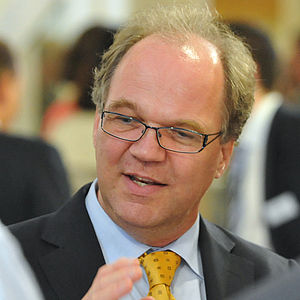
Professor Dirk Heckmann
Which data merits protection and why?
Which data merits protection and why?
Professor Dirk Heckmann holds the Chair of Law and Security of Digitization at the Technical University of Munich and heads the Research Centre for IT Law and Network Policy at the University of Passau. He is also a member of the federal government's Data Ethics Commission and serves, among other functions, as a constitutional judge in the Bavarian Constitutional Court. From 1998 to 2019 he held the Chair of Public Law, Security Law and Internet Law at the University of Passau.
Professor Horst-Alfred Heinrich
How do collective interpretations of cultural events emerge?
How do collective interpretations of cultural events emerge?
Professor Christoph Heinzl
How to analyse and visualise complex data in an intuitive and easy-to-understand way?
How to analyse and visualise complex data in an intuitive and easy-to-understand way?
Dr Christoph Heinzl has been Professor of Cognitive Sensor Systems at the University of Passau since September 2021. As such, he also heads the research group for knowledge-based image processing at the Fraunhofer Development Center X-ray Technology (EZRT). His research interests are found in scientific visualisation, visual analytics, virtual and augmented reality in visualisation, machine learning and X-ray computer tomography.
Professor Anna Henkel
How are relationships of responsibility changing in modern society?
How are relationships of responsibility changing in modern society?
Professor Anna Henkel has been holder of the Chair of Sociology of Technology and Sustainable Development at the University of Passau since 2019. The emphasis in her research is on sociological theory, research into knowledge, materiality and sustainability and research in the field of digitalisation. Since August 2021, Henkel has been a substitute member of the "Committee for Health and Safety at Work" of the Federal Ministry of Labour and Social Affairs.
Professor Moritz Hennemann
Which regulatory models for digital interaction should we be following in the 21st century?
Which regulatory models for digital interaction should we be following in the 21st century?
Professor Moritz Hennemann has held the Chair of European and International Information and Data Law and headed the Research Centre for Law and Digitalisation (FREDI) of the Faculty of Law at the University of Passau since 2020. His research revolves around the global development of data and data protection law as well as the legal and regulatory framework of the digital economy.
Professor Steffen Herbold
How can AI be used in software development?
How can AI be used in software development?
Professor Steffen Herbold has held the Chair of AI Engineering at the University of Passau since 2022. Prior to his appointment as Professor of "Methods and Applications of Machine Learning" at Clausthal University of Technology, he had served as stand-in data analysis professor on various occasions, including at the Karlsruhe Institute of Technology. He studied, completed his doctorate and earned his habilitation in computer science at Göttingen University.
Professor Oliver Hidalgo
What are the strengths and weaknesses, the opportunities and risks of democracy?
What are the strengths and weaknesses, the opportunities and risks of democracy?
Professor Oliver Hidalgo holds the Chair of Political Theory at the University of Passau. His main research interests are in democratic theory, the political history of ideas, and the relationship between politics and religion. He serves in a variety of capacities, including as spokesperson of the research group "Politics and Religion" at the German Political Science Association and as an active member of the ECPR Standing Group Democratic Innovations and the research group "Democracy Research" (DVPW).
Professor Ralf Hohlfeld
What challenges for raising public awareness arise as a result of digitisation?
What challenges for raising public awareness arise as a result of digitisation?
Professor Ralf Hohlfeld has held the Chair of Communication Studies at the University of Passau since September 2008. He established the bachelor’s degree programme “Journalism and Strategic Communication” and ran it from 2017 to 2021. He is also the spokesman for the Collegial Management of the Passau Centre for Digitalisation in Society (CeDiS). His research focuses are in the field of empirical journalism research, media change and disinformation in the digital society.
Professor Stefan Katzenbeisser
How can critical infrastructures in a networked world be protected against cyber attacks?
How can critical infrastructures in a networked world be protected against cyber attacks?
Professor Stefan Katzenbeisser holds the Chair of Computer Engineering at the University of Passau. He researches cyber security in embedded systems, critical infrastructures and technical data protection. He is spokesperson of the research cluster "ForDaySec - Security in everyday digitalisation", which is funded by the Bavarian Science Ministry. Besides participating in research projects on secure mobility, he is also involved in the research initiative "6G Research and Innovation Cluster (6G-RIC)". Since November 2023, Professor Katzenbeisser has been a representative of the DFG Review Board “Security and Dependability, Operating, Communication and Distributed Systems”.
Professor Elif Bilge Kavun
How can artificial intelligence methods be used to make IT systems more secure?
How can artificial intelligence methods be used to make IT systems more secure?
Professor Elif Bilge Kavun is Assistant Professor for Secure Intelligent Systems at the University of Passau. Before this, she was "Lecturer" for Cybersecurity at the University of Sheffield (Great Britain) and Digital Design Engineer for Crypto Cores at Infineon (Munich). She completed her doctorate on "Embedded Security" at Ruhr University Bochum in 2015. Professor Elif Bilge Kavun researches the security of novel intelligent systems as well as traditional computer and embedded systems. Among other things, she devotes herself to physical attacks and countermeasures.
Proessor Ralf Kellner
How can data and models be used to explain behaviour on financial markets?
How can data and models be used to explain behaviour on financial markets?
Professor Ralf Kellner holds the Chair of Financial Data Analytics. His work combines aspects of economics, data science and statistics. The chair's research interests lie at the intersection of these fields, with an empirical and application-oriented focus. In general, the question arises as to whether and how modern methods of statistical learning and artificial intelligence can be used to generate insights into the complex interrelationships of data-based decision-making processes that ultimately generate value.
Professor Thomas Knieper
What are the underlying strategies of digital communication phenomena?
What are the underlying strategies of digital communication phenomena?
Professor Thomas Knieper has held the Chair of Digital and Strategic Communication at the University of Passau since 2010. He is director of the non-profit organisation Jugend Film Fernsehen e.V. (JFF) in Munich. Before taking up his position in Passau, he had served as full professor for communication and media studies at TU Braunschweig, as managing director of IWF Wissen und Medien gGmbH in Göttingen and as assistant professor at the Institute of Communication and Media Research at LMU in Munich. In his research, he studies media change with a special focus on online communication.
Professor Andreas König
How do established organisations and their leaders respond to the discontinuities that emerge with digitalisation?
How do established organisations and their leaders respond to the discontinuities that emerge with digitalisation?
Professor Andreas König holds the Chair of Strategic Management, Innovation, and Entrepreneurship and is deputy spokesperson of the DFG Research Training Group 2720: "Digital Platform Ecosystems (DPE)" at the University of Passau. His research output is published in leading international journals such as Administrative Science Quarterly, the Academy of Management Review and Research Policy.
Professor Harald Kosch
How can intelligent systems source information from across various media?
How can intelligent systems source information from across various media?
Professor Harald Kosch has held the Chair of Distributed Information Systems at the Faculty of Computer Science and Mathematics since 2006. He is the German director of DFH/UFA Doctoral College, which brings together INSA de Lyon and the University of Passau. The main purpose of this exchange is to facilitate cooperation projects in intelligent digital systems.
Professor Hans Krah
How credible is the worldview created by the digital and analogue media?
How credible is the worldview created by the digital and analogue media?
Professor Hans Krah holds the Chair of German Literature and Film at the University of Passau. He generates ideas for the DFG-funded Research Training Group 1681/2 ‘Privacy and Digitalisation’, which is currently in its second funding term.
Professor Jan Krämer
What conditions are required on the internet to create competition and innovation?
What conditions are required on the internet to create competition and innovation?
Professor Jan Krämer holds the Chair of Internet and Telecommunications Business and is spokesperson of the DFG Research Training Group 2720: "Digital Platform Ecosystems (DPE)" at the University of Passau. He is a Research Fellow at the Centre on Regulation in Europe (CERRE), a Brussels-based think tank.
Professor Martin Kreuzer
How do you check the security of encryption systems using computer algebra?
How do you check the security of encryption systems using computer algebra?
Professor Martin Kreuzer has held the chair of Mathematics with a focus on Symbolic Computation since 2007. His main research areas are computer algebra, commutative algebra, algebraic geometry and their applications. He is particularly interested in algebraic cryptography, which deals with the construction of new cryptosystems and the security analysis of existing cryptosystems using algebraic methods. The DFG project "Algebraic Error Attacks", which investigates the protection of cryptographic hardware against fault injections, is his most important activity in this field.
Professor Franz Lehner
What business models are viable for regional cloud service providers?
What business models are viable for regional cloud service providers?
Professor Franz Lehner has held the Chair of Information Systems (Information and IT Service Management) at the University of Passau since 2004. He is the founder and creator of the European Conference on Software Maintenance and Reengineering (CSMR) and the International Association of Knowledge Management (IAKM). He was the founding President of the Danube University Krems.
Professor Kai von Lewinski
What does the internet mean for geographically limited legal systems?
What does the internet mean for geographically limited legal systems?
Professor Johann-Mattis List
How to compare the over 6 000 languages spoken around the world, and how do computer-based methods help?
How to compare the over 6 000 languages spoken around the world, and how do computer-based methods help?
Comparative Linguist Johann-Mattis List has held the Chair for Multilingual Computational Linguistics at the University of Passau since January 2023 and heads the ERC-funded research group "ProduSemy". Before that, he served as stand-in professor at Bielefeld University and as senior researcher at the Max Planck Institute for Evolutionary Anthropology in Leipzig and the Max Planck Institute for the Science of Human History in Jena where he headed another ERC-funded research group on computer-assisted language comparison. Professor List earned his doctorate at the Heinrich Heine University in Düsseldorf and wrote his habilitation at the Friedrich Schiller University in Jena.
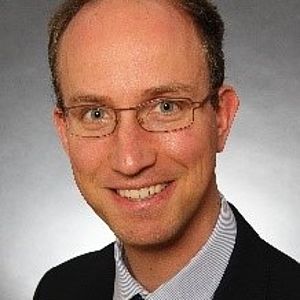
Professor Sebastian Martens, M.Jur. (Oxon.)
How can the law contribute to a fair distribution of burdens in times of crisis?
How can the law contribute to a fair distribution of burdens in times of crisis?
Professor Sebastian Martens, M.Jur. (Oxon.) has been holder of the Chair of Civil Law, Roman Law, European Private Law and European Legal History at the University of Passau since 2015.
Professor Susanne Mayr
How does being connected online affect us as humans?
How does being connected online affect us as humans?
Professor Susanne Mayr has held the Chair of Psychology and Human–Machine Interaction of the Faculty of Social and Educational Sciences since 2015.
Professor Hermann de Meer
How can we make the electricity network safe and stable using digitalisation?
How can we make the electricity network safe and stable using digitalisation?
Professor Hermann de Meer holds the Chair of Computer Networks and Computer Communications at the University of Passau and is Honorary Professor at University College London. Previously, he held positions as Junior Professor at the University of Hamburg and Visiting Professor at Columbia University in New York City, USA. His research interests include cloud computing, energy systems, network virtualisation, IT security, smart grid, smart city, Industry 4.0, the digitalisation of energy systems, computer networks, and computer communication, as well as distributed computing.
Professor Moritz Müller has held the Chair of Mathematical Logic since October 2022. He came to Passau from the University of Freiburg, via Barcelona and Vienna. His research focuses on the interface of mathematical logic and theoretical computer science, in particular proof complexity.
Professor Ulrike Müßig
How have Human Rights evolved in Europe
How have Human Rights evolved in Europe
Professor Ulrike Müßig is head of the Chair for Civil Law, German and European Legal History at the University of Passau. She served as Professeur invité at Paris II (Panthéon-Assas, 2019/20), as Advanced Grantee (ReConFort, 2014-18) and is corresponding member of the Austrian and Andalusian Academy of Sciences.
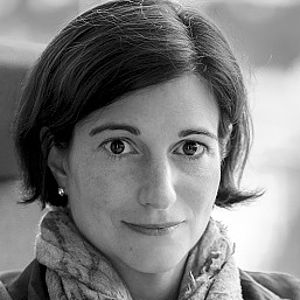
Professor Bettina Noltenius
Under what conditions should the state be allowed to restrict citizens' rights to freedom with the aid of coercive measures?
Under what conditions should the state be allowed to restrict citizens' rights to freedom with the aid of coercive measures?
Professor Bettina Noltenius is holder of the Chair of Criminal Law, Criminal Proceedings Law, Criminology and Philosophy of Law at the University of Passau. The emphasis in her research is on German and European (criminal) law, philosophy of law and German criminal law in modern times.
Professor Alena Otto
How should management strategies be designed in the digital age?
How should management strategies be designed in the digital age?
Since 2019, Professor Alena Otto has been holder of the Chair of Business Administration with a focus on Management Science/Operations and Supply Chain Management at the University of Passau. Prior to her academic career, Professor Otto worked as a strategy consultant in Ukraine, Germany and Russia.
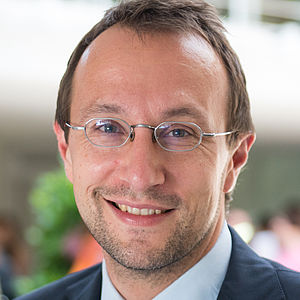
Professor Robert Obermaier
How can enterprises be steered through a crisis?
How can enterprises be steered through a crisis?
Professor Robert Obermaier is holder of the Chair of Accounting and Control at the University of Passau. He was Vice President for Research from 2020 to 2023 and from 2012 to 2014. His work is concentrated on the areas of controlling, enterprise assessment, production and decision theory.
Professor Martina Padmanabhan
What opportunities and problems does digitalisation pose for the disadvantaged?
What opportunities and problems does digitalisation pose for the disadvantaged?
Professor Martina Padmanabhan has held the Chair of ComparativeDevelopment and Cultural Studies with a focus on Southeast Asia since 2012, where she implements new methodologies for interdiciplinarity.
Professor Joachim Posegga
How to make IT applications secure in everyday life?
How to make IT applications secure in everyday life?
Professor Joachim Posegga holds the Chair of IT Security at the University of Passau. He earned his doctorate at Karlsruhe Institute of Technology (KIT) and conducted industrial research in the field of security for a period of ten years before he was appointed head the Research Group "Security in Distributed Systems" of the Department of Informatics at the University of Hamburg. In 2009, he moved on to Passau and was appointed head of the Institute for IT Security and Security Law (ISL). In his research, he focuses on web security, security architectures and protocols, placing a special emphasis on the Internet of Things.
Professor Joscha Prochno
How do geometrical structures behave when the spatial dimension tends to infinity?
How do geometrical structures behave when the spatial dimension tends to infinity?
Professor Joscha Prochno was awarded his doctorate in 2011 at Kiel University, where he had previously earned his Diplom degree. His academic career then took him to the University of Alberta in Canada, the Johannes Kepler University of Linz in Austria and the University of Hull in England. He has been professor at the University of Passau since April 2021 and holds the Chair of Functional Analysis. Professor Prochno also serves as co-editor of the two journals Mathematische Nachrichten and Journal of Complexity. In 2021, Professor Prochno was awarded Austria's most prestigious mathematics prize.
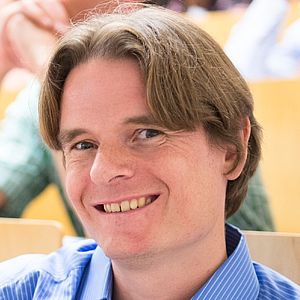
Professor Malte Rehbein
How can historical sources be digitalised and assessed with the assistance of computers?
How can historical sources be digitalised and assessed with the assistance of computers?
Professor Malte Rehbein has held the Chair of Digital Humanities at the University of Passau since 2013. He is a member of both the board of Digital Humanities in German Speaking Countries and the Scientific Advisory Board of Deutsches Museum.
Professor Karoline Reinhardt
What kind of ethical questions are raised by of social and political transformation?
What kind of ethical questions are raised by of social and political transformation?
Professor Karoline Reinhardt is Junior Professor for Applied Ethics at the University of Passau. Before taking on her position at the University of Passau, she was a PostDoctoral fellow at the Ethics & Philosophy Lab of the DFG Cluster of Excellence “Machine Learning: New Perspectives for Science” and the International Center for Ethics in the Sciences and Humanities at the University of Tübingen. Previous to that, she held research and teaching positions at universities in Ankara, Graz, New Orleans, and Munich. She is a member of the Young Academy of the Heidelberg Academy of Sciences. In September 2024, she received the Kant Young Talent Award from the Kant Society and the Fondazione Silvestro Marcucci.
Professor Lars Rensmann
What new and old risks does democracy face in the digital age?
What new and old risks does democracy face in the digital age?
Professor Lars Rensmann has held the Chair of Political Science with a focus on Comparative Government since the summer semester of 2022. Before that, he served as professor for European policy and society at the University of Groningen, as associate professor of political science at John Cabot University in Rome and as DAAD assistant professor of political science at the University of Michigan. In his research, Professor Rensmann studies crises of democracy, authoritarianism, antisemitism, populism and right-wing radicalism around the world using a comparative approach. He is currently conducting a "darkfield study" in North Rhine-Westphalia to shed light on the spread of antisemitic prejudice and resentment in society.
Professor Ursula Reutner
Where will digitalisation take us: towards a unified culture or ever greater diversity?
Where will digitalisation take us: towards a unified culture or ever greater diversity?
Professor Ursula Reutner has held the Chair of Romance Languages and Cultures of the University of Passau since 2009; since 2014 she has held the post of Vice President for International Relations.
Professor Thomas Riehm
What does digitalisation mean for the application and development of laws that are over 100 years old?
What does digitalisation mean for the application and development of laws that are over 100 years old?
Professor Thomas Riehm holds the Chair of German and European Private Law, Civil Procedure and Legal Theory and is the speaker of the Institute for Digital Society Law (IRDG) as well as a member of the Passau Institute for Digital Security (PIDS). His main research interests are contract and liability law with a focus on IT matters but also civil dispute resolution, including their digitalisation. Among other areas, he focuses on the legal issues that arise from the digitalisation of civil law proceedings, the use of AI, contract law for digital services, and the adaptation of form requirements to digitalisation needs.
Professor Daniel Rudolf
How can we algorithmically extract information from data and evaluate the resulting methods?
How can we algorithmically extract information from data and evaluate the resulting methods?
Professor Daniel Rudolf has been Chair of Mathematical Data Science at the University of Passau since October 2021. After completing his Ph.D. in Jena, he was a research fellow in Sydney, served as an interim professor in Chemnitz, and was an assistant professor for Mathematical Statistics in Göttingen before accepting his current position in Passau. His research focuses on computational statistics, with a particular interest in the combination of applied and theoretical scientific questions, which he finds especially compelling.
Professor Maximilian Sailer
How can digital media be used in an educationally meaningful way?
How can digital media be used in an educationally meaningful way?
Professor Maximilian Sailer has held the Chair of Educational Science at the University of Passau since 2019. He completed his doctorate at the University of Eichstätt-Ingolstadt and habilitated in 2009 on the topic of " Job profiles and the academic labour market - job advertisement analysis as a method of education and qualification research". During his work as an post-doctoral researcher at the Chair of Education with a focus on adult and further education at the University of Augsburg, he held several interim professorships at the LMU Munich and the University of Passau.
Professor Tomas Sauer
How can strategies of image processing and deep learning be combined?
How can strategies of image processing and deep learning be combined?
Professor Wolfram Schaffar
How can the authoritarian turn be recognised?
How can the authoritarian turn be recognised?
Professor Wolfram Schaffar has held the Chair of Development Policy at the University of Passau since April 2021. Previously, he was, among other things, Professor of Japanese Studies at the University of Tübingen and Professor of Political Science and Development Research at the Institute for International Development at the University of Vienna.
Professor Stefanie Scherzinger
How to bring order to large data volumes?
How to bring order to large data volumes?
Professor Stefanie Scherzinger holds the Chair of Scalable Database Systems at the University of Passau. Passau is where she had studied Computer Science and embarked on her academic career. After gaining experience in the field as a software developer with IBM and Google, she was professor at OTH Regensburg for eight years before she was offered a position at the University of Passau in April 2020.
Professor Hannah Schmid-Petri
How are digitalisation issues publicly discussed and what consequences does that have for political processes?
How are digitalisation issues publicly discussed and what consequences does that have for political processes?
Professor Hannah Schmid-Petri is the holder of the Chair of Science Communication at the University of Passau and one of the principal investigators of the DFG Research Training Group 2720 "Digital Platform Ecosystems (DPE)". She is also a member of the Board of Directors of Bavarian Research Institute for Digital Transformation and part of the jury for the DFG Communicator Award. Before her time in Passau, she was a senior assistant at the Institute of Communication and Media Studies at the University of Bern.
Professor Christine Schmitt
How can I reconcile the conservation and utilisation of natural resources and biodiversity?
How can I reconcile the conservation and utilisation of natural resources and biodiversity?
Professor Christine Schmitt has been Chaired Professor of Physical Geography with a focus on Human-Environment Research at the University of Passau since April 2021. She is an active member of the scientific advisory board of the Society for Tropical Ecology (gtö) and of the BayWISS Joint Academic Partnership Life Sciences and Green Technologies and has experience in policy support at an international level.
Professor Meinhard Schröder holds the Chair of Public Law, European Law and IT Law. He is a member of the Passau Institute of Digital Security (PIDS) and the Institute for Digital Society Law (IRDG). His research interests include German and European economic constitutional and administrative law, administrative procedural law and e-government law, municipal law, data protection law and data law.
Professor Jan Hendrik Schumann
How does it affect people when firms pass on their data?
How does it affect people when firms pass on their data?
Professor Jan Hendrik Schumann has held the Chair of Marketing and Innovation of the University of Passau since 2012. He is also one of the principal investigators of the DFG Research Training Group 2720. Since July 2013, he has also worked a director of the Institute of Market and Economic Research.
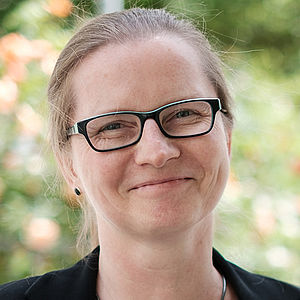
Professor Andrea Sieber
What image of the Middle Ages do the modern media give us?
What image of the Middle Ages do the modern media give us?
Professor Andrea Sieber has been holder of the Professorship of Medieval German Literature at the University of Passau since 2016. The emphasis in her research is on the history of literature and media and the reception of the Middle Ages. Since September 2019 she has been a board member at the Association of German Philologists (DGV).
Professor Malte Steinbrink †
How can we explain the geographical dimensions of social inequalities?
How can we explain the geographical dimensions of social inequalities?
Professor Malte Steinbrink was holder of the Chair of Social and Cultural Geography. This social and cultural geographer was a member of the interdisciplinary Institute for Migration Research and Intercultural Studies (IMIS) and a Senior Research Fellow at the University of Johannesburg (South Africa). His research interests included geographical development, migration and tourism research and empirical scientific observation.

Professor Christian Thies
What can classical philosophy contribute to the digital society?
What can classical philosophy contribute to the digital society?
Professor Christian Thies has been holder of the Teaching Professorship of Philosophy at the University of Passau since 2009. The emphasis in his research is on practical philosophy and, seen historically, in particular classical German philosophy.
Professor Florian Töpfl
How does Moscow influence media audiences abroad using internet-based technologies?
How does Moscow influence media audiences abroad using internet-based technologies?
Professor Florian Töpfl holds the Chair of Political Communication with a Focus on Eastern Europe and the Post-Soviet Region at the University of Passau. He heads the ERC Consolidator project "The Consequences of the Internet for Russia’s Informational Influence Abroad (RUSINFORM)" at the University of Passau. Before Dr. Töpfl was appointed professor at the University of Passau in 2020 he conducted research as the head of an Emmy Noether Research Group at Freie Universität Berlin (2014-2019) and as Marie Curie Postdoctoral Fellow at the London School of Economics and Political Science (2012-2014).
Professor Brian Valerius
How transparent does artificial intelligence have to be?
How transparent does artificial intelligence have to be?
Brian Valerius has held the Chair of Artificial Intelligence in Criminal Law at the University of Passau since October 2022. In his research, he deals with substantive criminal law and criminal procedure in its entirety. Last but not least, he is dedicated to issues of medical law and the legal challenges of digitalisation and artificial intelligence.
Professor Grischa Vercamer
What image of rulership of princes does medieval historiography convey?
What image of rulership of princes does medieval historiography convey?
Professor Grischa Vercamer has been Heisenberg Professor of the History of Eastern and Central European Cultures in the Late Middle Ages and Early Modern Period since January 2025. As part of the prestigious DFG funding programme, he researches the depiction of the late medieval prince in historiographical works in Bohemia, Austria and southern Germany in military and religious contexts. He also analyses the lower nobility in the territory of the Holy Roman Empire. Previously, he was a deputy professor at the TU Chemnitz and the University of Passau. He completed his doctorate at the FU Berlin and his postdoctoral thesis in medieval history at the European University Viadrina in Frankfurt/Oder.
Professor Daniela Wawra
How do culture and language shape analogue and digital interactions?
How do culture and language shape analogue and digital interactions?
Professor Daniela Wawra has held the Chair of English Language and Culture of the Faculty of Arts and Humanities since 2010. From 2018 to 2020 she was Vice President for Study, Teaching and Internationalisation at the University of Passau.
Professor Thomas Widjaja
What changes when companies develop new services using customer data?
What changes when companies develop new services using customer data?
Professor Thomas Widjaja has held the Chair of Business Information Systems since 2016. He is also one of the principal investigators of the DFG Research Training Group 2720. Previously, he gained his doctoral and postdoctoral degrees at TU Darmstadt.
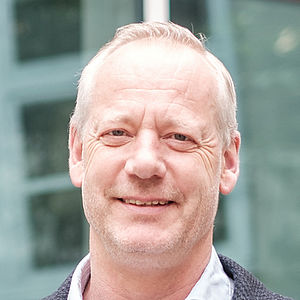
Professor Thomas Wünsch
What defines history and culture in Ukraine?
What defines history and culture in Ukraine?
Professor Thomas Wünsch holds the Chair of Modern and Contemporary History of Eastern Europe and its Cultures. In his research he focuses on the history and culture of Poland, Czechia, Ukraine, Russia, Central Asia and the Balkans. He heads a branch of Südosteuropa-Gesellschaft and the Perspektive Osteuropa initiative at the University of Passau.
Professor Jens Zumbrägel
How can abstract maths be used to enhance the security of encryption?
How can abstract maths be used to enhance the security of encryption?
Professor Jens Zumbrägel has been Professor of Mathematics with a focus on Cryptography since 2017. He is all enthusiastic about algebra and its applications in public key cryptography and communication technology. His research focus is on the discrete logarithm problem, and currently also on post-quantum cryptography and codes over rings.

































































